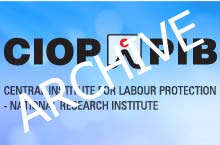
 |
About us |
 |
Research area |
 |
News |
 |
Our Offer |
 |
OSH abroad |
 |
Certification |
 |
Library |
| ||
 | One of the very importand and current issuses in Poland is the assurance of safety of establishments and instalations in which hazardous chemical substances are produced, processed or stored.
The release of such substances into the environment, fire or explosion in the event of an accident in such a establishment generally results in very serious, often catastrophic consequences. Such events, which are described as begin major industrial or chemical accidents are unfortunately reasonably frequent worldwide. Many industrial chemical accidents and catastrophes that took place in the world and in Europe over the past twenty or so years have resulted in appropriate action begin taken by international organisations and the organisations of developed nations. The principles, procedures and duties of the Management Boards of hazardous establishments and the appropriate public authorities and services having the objective of preventing such accidents, preparing for such an event and the correct response to reduce or liquidate their consequences have been included in international legislation as well as in the laws of many countries. These are primarily European Union Directives - the so called Seveso Directive of 1982, and the currently valid significantly stricter Seveso II Directive of 1996, international conventions and OECD recommendations from the years 1988-1992. The analysis of the National Labour Inspectorate (PIP), Environmental Protection Inspectorate (IOŚ) and the National Fire Brigade (PSP) carried out in the Central Institute for Labour Protection have demonstrated that the number of establishments in Poland that could represent a major hazard could be as high as 200 or more. The number of establishments creating a local hazard in the event of an accident could, according to PIP, IOŚ and PSP data, amount to several hundred. The scale of threats of serious chemical accidents in Poland is high. Laws in Poland that introduce a system of prevention, readiness and response to serious industrial accidents that are appropriate to the requirements of the EU have been introduced in the new act on the Environmental Protection law, which was approved by the Parliament on 27/04/2001 (Journal of Laws no. 62, item 627). They entered into force on the strength of the provisions of a separate act by way of the introduction of the environmental protection law, the act on solid waste and the amendments to several acts of 1 October 2001 (Journal of Laws no. 100, item 1085). detalied regulations on a series of areas within the issues of preventing major industrial accidents were contained in several regulations of Minister of the Economy and the Minister of the Environment. The Central Institute for Labour Protection is one of the few scientific and research institutions in Poland that has been working in this area for several years in order to solve various tasks. A significant direction of the activites of CIOP in this respect is that of activities in the field of popularisation and diffusion of the principles and procedures of preventing major chemical accidents. A series of articles was therefore published for this purpose and training materials were prepared, while issues related to the prevention of the hazards in question were included in the postgraduate study programmes and other training courses held by CIOP. CIOP's activities in this area also include lectures and papers at training courses and seminars organised by many institutions. On CIOP's initiative, six research projects were carried out in the 2nd stage of the National Programme (formerly SPR-1) "Safety and protection of man in the working environment" in 5 scientific and research institutions in the years 1998 - 2001 (Central institute of Labour Protection, Institute of Industrial Chemistry, Institute of Atomic Energy, Institute of Environmental Protection and the Main School of the Fire Service. The tasks coordinated by CIOP had the purpose of developing solutions that assist the management boards of hazardous establishments, the appropriate public authorities and services to prevent major industrial accidents. Several research tasks are currently being undertaken within the framework of the National Programme "Adjustment of working conditions in Poland to European Union standards" (2002 - 2004) with the purpose of developing further tools to support the Polish system for preventing major accidents. The work undertaken by CIOP and the Institute's activities in terms of cooperation with many Polish institutes has meant that CIOP is currently one of the leading national institutes on matters of preventing major industrial chemical accidents and the limitation of their effects. CIOP's specialists also participate in the implementation of important international programmes. Prof. Dr. hab. Eng. J. S. Michalik was a leading European Union expert in the EU's TACIS Programme, undertaken in the years 2000 - 2002 for the Russian Federation "Support to the Ministry of Emergencies on industrial accident preventionand preparedeness (FINRUS 9806)". Based on the analysis of the laws of the Russian Federation on the prevention of serious industrial accidents and their comparison with the standards of the EU and selected countries, changes were proposed to Russia's federal legal acts in order to introduce improvements and to make changes as to the liability and the function of the state supervision, as well as to the legal tasks of the authorities of the Russian Federation. The proposals were accepted by Russia. The results were presented in several reports, papers and monographs. |
